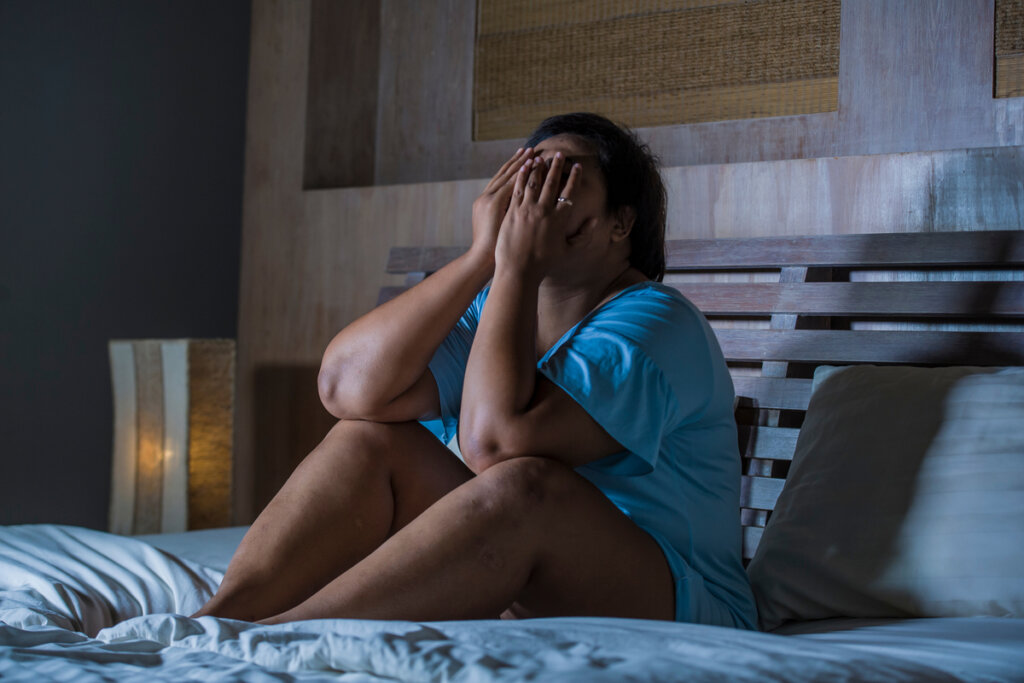Nine Warning Signs of a Depression Relapse


Written and verified by the psychologist Valeria Sabater
Few realities cause more concern than a depression relapse. However, it’s quite common during the follow-up period to lose some of the gains made in the initial intervention.
In fact, maladaptive thoughts often occur at this time, complicating any treatment designed to prevent relapse. During these times, the sufferer usually feels weak or insecure with damaged self-esteem. That said, they also, by now, recognize their enemy well and know what steps to take.
Asking for help is essential. This measure is aimed at stopping the thoughts that feed feelings of helplessness, shame, or guilt. After all, these sensations and self-perceptions only aggravate the discomfort.
Indeed, the way in which a sufferer faces a relapse is paramount. As such, having specialized help is crucial.
They also need to know how to detect changes and indicators associated with their depression. That’s because although they might experience the same symptoms as they did the first time, new triggers are often added. Let’s take a look at the symptomatology associated with a depression relapse.
It’s estimated that a third of people who stop both therapy and treatment relapse into depression in the following months.

The alarm signals of a depression relapse
You might wonder why some people are able to overcome depression without relapsing. There are multiple factors at play here. The first is the quality of the treatment and the second is the propensity of the sufferer to adopt certain lifestyle habits that are more compatible with certain thoughts, such as those of inadequacy.
An investigation published by the National Library of Medicine claims that nearly one-third of depressed people who suddenly stop medication and therapy sessions relapse within a year. There are always residual dimensions and unresolved problems and certain strategies that tend to favor this reappearance.
However, recovery from a psychological disorder is never static or linear, and relapses are common. It’s even seen as part of the healing process. Therefore, sufferers should never blame themselves for a relapse, but simply take responsibility for what’s happening.
For this reason, they must know how to recognize the signs of a depression relapse.
1. Emotional numbness: not feeling anything
One of the obvious characteristics of a depression relapse is that the sufferer begins to disconnect from their surroundings. In fact, they gradually stop experiencing any emotions in situations that, generally, should make them feel joy, happiness, sadness, or even anguish.
Life begins to feel lower both in decibels and motivation and their interest in working, socializing, or enjoying leisure is reduced.
Emotional clouding is usually a sign of an unhealed and latent depression in the sufferer. It can also be a sign of post-traumatic stress disorder.
2. Not wanting to go out
While it’s natural to occasionally not feel like going out to dinner or a concert or visiting friends and family, one of the signs of a relapse into depression is an increasingly obvious desire to stay home and not venture out at all.
Sufferers lack the energy to go to work, do the shopping, pick up the children from school, etc. In effect, they stop being a socially active person interested in life.
3. Changes in sleep patterns
Sleep disturbances are always a recurrent symptom in mood disorders. Sufferers don’t only experience insomnia or wake up tired from interrupted and unrefreshing sleep, they might also suffer from hypersomnia. This means sleeping excessively and having a persistent need to close their eyes and escape from everything.
4. Self-criticism and irritability
Almost without knowing how it’s happened, they begin to dislike their own company. They lack patience, feel more irritable and hypersensitive, and everything bothers or worries them, making them hypersensitive. This attitude often leads to uncomfortable moments and arguments with others, that, in the long run, make them feel worse about themselves.
Self-criticism and devaluing themselves are other signs of a depression relapse. Their mind turns against them and they stop being compassionate with themselves. Gradually, this plunges them into a clear drift toward mental discomfort.
5. Brain fog
Making decisions, concentrating, reflecting, and even remembering simple things becomes complicated. Brain fog is a cognitive symptom of depressive disorders that can’t be ignored. Confusion, suffering from forgetfulness, and difficulty in planning tasks are signs that must never be neglected.
6. Changes in diet
Some people lose their appetite and the pleasure of eating. Others start to relate inappropriately to food. They might resort to binge eating, or eating the kinds of high-calorie foods solely for the pleasure they generate in their brain.
In fact, the links we all establish with food often reflect our states of mind. Therefore, these kinds of behaviors should never be ignored.
A loss of appetite or a constant need to eat can be signs of a depressive disorder.
7. Loss of sexual desire
It’s extremely common that, when there’s a latent depression, sexual desire fades. Sufferers start to distance themselves from their partners under the sheets. In fact, erectile dysfunction can be an inescapable symptom of a latent psychological problem.
8. Somatic symptoms: when the body speaks
Back pain, digestive or intestinal disorders, unexplained tiredness, headaches, hair loss, a tendency to suffer from infections…
Another sign of relapse in depression is the appearance of health disorders and somatic symptoms that don’t always have a specific biological origin. The trigger, in these cases, is emotional.

9. Feelings of worthlessness
“What’s the point of everything? Why do I even bother when nothing ever works out for me and I have no control over what happens to me?” If we could listen to the thoughts of a sufferer of depression we might find it pretty scary. Indeed, their feelings of worthlessness and self-loathing are like a persistent echo in their mind.
The importance of asking for help
We can’t conclude this article without confirming that a relapse into depression isn’t the end of the world. Nor is it a symptom of fallibility or weakness. Everyone heals in their own way and not everyone is successful the first time. Relapse is more frequent than you might think.
Nevertheless, it’s always imperative to seek specialized help. Cognitive therapy focused on mindfulness is particularly effective in preventing depression relapse. Sufferers need to take responsibility for themselves and take the first step forward.
Asking for help is an exercise in courage that allows sufferers to acquire adequate skills to leave this situation behind them.
All cited sources were thoroughly reviewed by our team to ensure their quality, reliability, currency, and validity. The bibliography of this article was considered reliable and of academic or scientific accuracy.
- Lin EH, Katon WJ, VonKorff M, Russo JE, Simon GE, Bush TM, Rutter CM, Walker EA, Ludman E. Relapse of depression in primary care. Rate and clinical predictors. Arch Fam Med. 1998 Sep-Oct;7(5):443-9. doi: 10.1001/archfami.7.5.443. PMID: 9755737.
This text is provided for informational purposes only and does not replace consultation with a professional. If in doubt, consult your specialist.








